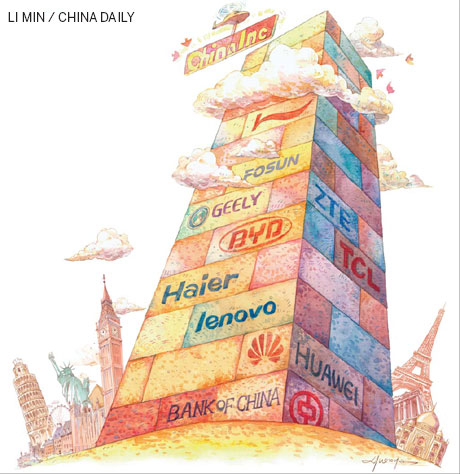Wheel turns full circle for Chinese firms
Updated: 2011-12-09 08:10
By Zhou Yan and Diao Ying (China Daily)
|
|||||||||||

Domestic companies make rapid strides on global stage with slew of M&A deals
When China joined the World Trade Organization (WTO) 10 years ago, for Western multinationals it was not only a cheap manufacturing location, but also a market with immense potential. But a decade later, the wind has been slowly changing its direction - more Chinese companies are now turning global players, and seeking resources and consumers in the West.
Large State-owned companies have been the main drivers of the rush to the West. China Petrochemical Corp, or Sinopec Group, the country's biggest refiner, said in November that it would pay $3.5 billion for a 30-percent stake in the Brazilian unit owned by Portuguese oil company Galp Energia SA, the latest move by the company to buy into oil and gas reserves in Brazil. The deal followed its 2010 purchase of a 40-percent stake in another Brazilian unit of Spanish oil company Repsol for $7.1 billion, as part of its efforts to boost upstream reserves.
It is not State-owned companies alone that are expanding overseas. The country's largest privately owned companies are also joining the race. A new chamber, the China International Chamber of Commerce for the Private Sector (CICCPS) was set up in Beijing recently and has more than 100 members, including some of the nation's biggest private enterprises like Geely Automobile Holdings Ltd, the auto giant that bought Sweden's Volvo AB last year, and New Hope Group Ltd, China's largest producer of animal feed.
The aim of the CICCPS is to facilitate overseas investment by private companies, including the provision of coordination between domestic and foreign government agencies, and in setting up platforms for financing.
"Internationalization has become the strategy for many Chinese companies," said Zheng Yuewen, chairman of the organization. "They need to develop on a global scale and be internationally competitive."
The country's 7.5 million privately owned companies have become a major force in overseas investment. Over the next three years, one-third of them will set up sales networks overseas and a quarter of them will establish offices in other countries, according to Guo Guangchang, chairman of Fosun International Ltd, one of China's largest conglomerates.
According to figures compiled by mergermarket.com, an independent mergers and acquisitions (M&As) intelligence service provider, during the first nine months of 2011, the country's outbound M&A volume reached $21.4 million, half of which came from sectors like energy, chemicals and materials.
Even though emerging markets have not yet become major investment destinations for Chinese companies, Eleanor Wu, Ernst & Young's (E&Y) partner for transaction services, feels that cross-border deals in nations like Brazil and Argentina would increase in the future as global investors, especially those from China, have chalked out big plans to tap into the two countries to diversify their investment portfolio.
China, through its "going overseas" strategy, aims to build first-class domestic enterprises with global competitiveness, Wu said.
Statistics have proved the effectiveness of overseas expansion for a company's recognition on the global stage. The number of Chinese companies listed in the Fortune Global 500 in 2011 grew to 61 from 16 in 2005.
Sinopec Group was ranked 5th in the Fortune Global 500 in 2011, up from 7th in 2010, while China National Petroleum Corp (CNPC), the country's biggest oil producer, was ranked 6th this year from 10th a year ago.
CNPC chairman Jiang Jiemin said in October that in the following years the company would continue its overseas expansion with Canada and Australia being the primary targets due to their abundant natural resources and sound investment environment.
Jiang said the company's overseas oil and gas output is expected to hit 100 million tons of oil equivalent in 2011, compared with 86.73 million tons last year. CNPC's listed entity PetroChina joined Royal Dutch Shell in 2010 to buy Australia-based coalbed gas company Arrow Energy for $3.2 billion. The company had also planned to buy a 50-percent stake in Canadian energy company Encana in February, but the deal did not materialize.
CNPC's rival Sinopec has also been accelerating its pace in acquiring overseas assets by purchasing Canada's Daylight Energy for $ 2.16 billion in October in the latest move to obtain gas reserves in Canada.
Sinopec has been making rapid strides in recent times after Fu Chengyu, the former chairman of China National Offshore Oil Corporation, was appointed its chairman in April, a move that is widely seen as the central government's intention to accelerate Sinopec's overseas expansion using Fu's vast experience in overseas M&As.
According to officials from the Ministry of Commerce, China's outbound direct investment (ODI) will grow by 30 percent every year and exceed foreign direct investment to China within three years. Figures compiled by the US-based Asia Society estimate that China's overseas assets via ODI are estimated to reach $2 trillion worldwide by 2020.
Chinese energy companies' recent overseas acquisitions seem to be in line with the early predictions from the Ministry of Commerce.
The US, the European Union and Latin America will see a rapid growth in investment from China in the future, said Zheng Chao, commercial counselor at the Department of Outward Investment and Economic Cooperation at the commerce ministry, in an interview with China Daily in May.
For oil companies, unconventional natural gas resources in Australia and Canada as well as liquefied natural gas resources in Australia are major assets, said Wu Mouyuan, a researcher at the Overseas Investment Environment Research Department, the research unit of CNPC.
So far, foreign-exchange reserves - totaling more than $3 trillion - have mainly been used to aid the overseas expansion of State-owned companies. Private enterprises might also be able to benefit from China's vast foreign-exchange reserves when making overseas investments.
"The investment of foreign-exchange reserves needs to be more diversified, and private business are an important channel for that," said Wu Xiaoqiu, director of the Financial and Securities Institute of Renmin University of China.
"Private companies have more advantages in decision-making systems, and are also better at executing plans compared with State-owned enterprises," said Wang Jianxi, executive vice-president and chief risk officer of China Investment Corp, the country's sovereign wealth fund.
China's increasingly important economic status in the world will lead the country to play a significant role on the global stage, E&Y's Wu said, but warned that Chinese companies will also meet challenges in growing internationally, including cultural differences, language barriers, financing difficulties, as well as government supervision.
"The companies should have a global strategy and shoulder global responsibility as they go out," said Wang Zhile, a researcher with the Ministry of Commerce. Some Chinese companies tried to get orders by bribing business partners for doing business with the World Bank.
They are being investigated and not allowed to do any business for the next five years. Some others were forced to exit from the Nasdaq after being found guilty of falsifying financial statements. "The global responsibility includes playing by the rules," Wang said. "Only by doing so can they grow their business, and do it for a long term."








